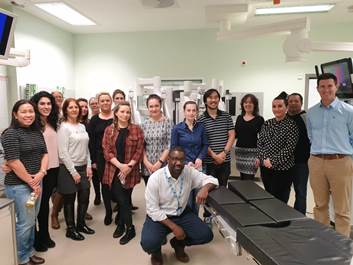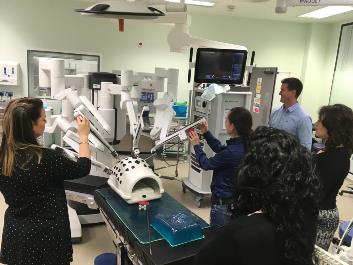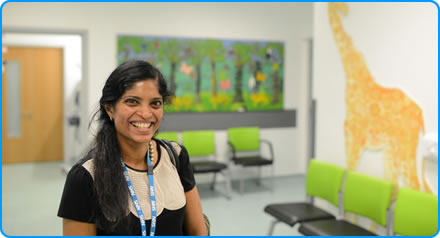If you are referred to the Fetal Medicine Unit for a specialist opinion, information and possibly for further tests please read the following.
Who are we?
We are a small team of Doctors and Midwives who specialise in Fetal Medicine (problems found in the baby before birth). We will try to answer all your questions. Please ask a member of staff to explain anything you do not understand or to discuss anything that happened during your visit(s).
What to expect?
The Fetal Medicine specialist may carry out a detailed ultrasound scan in order to examine the baby. They will then discuss the findings with you and what this may mean.
It is recommended that your partner, a relative or close friend accompany you to provide support. Where possible please do not bring children with you to the appointment. This is recommended so that you can concentrate on what is happening at the appointment.
Please bring your maternity hand held notes with you to your appointment.
How long will my appointment take?
We aim to see you as soon as possible and within 3 working days of a concern being raised. However, there are some instances where we will arrange to see you later than this. This may be dependent upon the reason for the referral. Sometimes it is helpful to have a longer period of time between the scans to assist with interpretation of the scan findings. Some people are also referred to us early in the pregnancy and it is too early for you to be seen. A member of staff will advise you about when you can expect to be contacted / seen.
On occasion we will be asked to see emergency cases within 24 hours of the referral. This can mean re-prioritising our appointment times on a daily basis, although we try to avoid this.
Appointments take variable lengths of time. We try to tailor our counselling and length of visit according to individual needs.
We appreciate that this is a stressful time for you and your family, but sometimes the time of your consultation may be delayed leading to longer waiting times on the day and some consultations may take longer than we anticipated. We apologise for this in advance. Be assured that this does not mean your consultation will be made shorter.
Sometimes it is necessary to refer you to other Hospitals for further assessment or tests.
Who will be present during my scan?
As we are a major teaching hospital there may be several people present during your consultation. These include the Fetal Medicine Specialist, Senior Doctors who are training in fetal medicine, the Midwife who is co-ordinating the clinic that day and occasionally a Student Doctor or Midwife.
Please let us know if you would rather not have extra people present.
What will happen during my visit?
The aim is to provide as much information as possible for you and the professionals involved in your care to plan the ongoing management of your pregnancy.
Specialist tests may be offered as appropriate, with information and full explanation of the risks and benefits given so that you can decide whether you wish to have further tests or not.
We will arrange with you when and how any further tests will be undertaken and how you will receive any results.
Scan Photography
We electronically store images to aid diagnosis, discuss with other specialists involved in your case and for audit purposes.
As far as possible personal details are restricted to maintain privacy and all images are kept on the fetal medicine unit database.
We are not able to record the scan on DVD for your own personal use but we may be able to provide scan pictures.
National Congenital Abnormality & Rare Diseases Registration Service (NCARDRS)
This department contributes information to NCARDRS (previously the South West Abnormality Register).
This register is
- To increase our understanding of congenital anomalies and help research into their causes, treatment and prevention.
- To look at trends - for example changes in the number of babies born with congenital anomalies, or changes in the pattern of where they are born. Any problems can be investigated.
- To give health professionals information to help them advise families about their chances of having a baby with a congenital anomaly.
- To help plan and develop NHS services.
- To monitor how good antenatal screening tests (blood tests and ultrasound scans) are at picking-up problems.
The NCARDRS leaflet is available to offer further information about this service visit gov.uk.
Location
The Fetal Medicine Unit is located in the Women & Children’s Quarter:
Southmead Hospital
Cotswold Clinic / Fetal Medicine Unit
Monks Park Way
Bristol
BS10 5NB
Telephone: 0117 4146928 Hours: 9am - 4pm
Parking is limited so please allow time to find a space. There are pay and display car parks located within the hospital.
Useful Contacts
Antenatal Results & Choices (ARC)
ARC offers non-directive information and support to parents before, during and after antenatal screening; when they are told their baby has an anomaly; when they are making difficult decisions about continuing with or ending a pregnancy, and when they are coping with complex and painful issues after making a decision, including bereavement. For more information for parents please visit the ARC website.
The helpline is answered by trained staff Monday to Friday, 10.00am-5.30pm.
Call 0845 077 2290 or 0207 713 7486 from a mobile.
ARC, 345 City Road, London, EC1V 1LR
Admin telephone: 020 7713 7356
Email telephone: info@arc-uk.org



